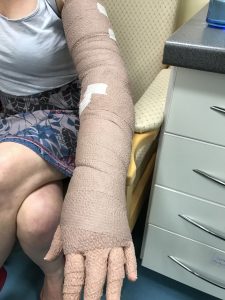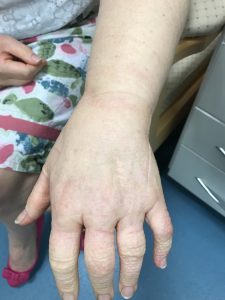This guest column is by Rachel Andrews of Gloucestershire, U.K., a Breast Cancer News reader who developed severe lymphedema (called lymphoedema in British English) as a result of her cancer treatments, and is undergoing a microsurgery procedure this week in an attempt to ease and correct that condition. Rachel asked to write this column so she could share with other breast cancer survivors similarly affected by lymphedema a potential surgical treatment.
***
I am full of life at 49, very soon to be 50 years old! I live in an old house, which I love, in a little village beside the River Severn in Gloucestershire with my husband of 23 years and our 18-year-old daughter. We also have identical twin sons who are at University in London, studying the same course at the same university! I have been a nurse since 1986 and currently work in Health Visiting. I love my garden, and we have two dogs, the coolest ginger tomcat, an ancient Angora goat and many free-ranging chickens. I am a member of a very active choir and the local book club. I try to continue with all my interests, work, and a busy, happy social life — while struggling with lymphedema, but it has become debilitating.
My story began on Christmas Eve 2013. I had been referred to a breast clinic for what I was sure would be another innocent cyst in my left breast. I remember feeling irritated that the biopsy taken that day prevented me from joining friends and family on the annual Christmas Eve community dog walk! I was unprepared for what lay ahead.
I was 47 and had just completed my post-graduate Health Visiting Course, having been nursing for 29 years. I received the news that I had breast cancer on Jan. 6, the very first day of my newly qualified role as a Health Visitor. I left work, saying buoyantly, “It’ll be fine, I’ll see you tomorrow.” I was a young 47, there was no family history of breast cancer, I had exclusively breast-fed all of my children, didn’t smoke, wasn’t overweight, and followed a healthy diet. I was totally unprepared for, and surprised by, the diagnosis I was given.
My overwhelming feeling on receiving my diagnosis was one of guilt. I am a mother to three children, identical twin boys who were 17 at the time, and a daughter who was 15. We had lost a beloved child in the family to cancer just two years prior to my diagnosis, something no family should ever have to live through. My family’s relationship with cancer was, therefore, not a positive one, and I was deeply sorry to add to my family’s pain.
I remained strong and positive throughout the two surgical procedures, a lumpectomy and axillary node clearance followed by chemotherapy and radiotherapy. I completed my treatment in September 2014. Gradually my hair grew back as did my toe and finger nails (that was a surprise when I lost those!), my energy returned and I regained the weight I had lost during chemotherapy. I returned to work in January 2015. It was time to relearn the job I had left on day one and regain my strength.

Six months later, without warning, I developed lymphedema of my left hand and arm. Once secondary cancer was ruled out, I commenced treatment with the Gloucestershire lymphedema team. But, despite the team’s best efforts, my lymphedema has become progressively severe. I use a loaned lymph assist machine daily when available, my husband has been instructed in delivering manual lymphatic drainage, and I wear compression garments on my hand and arm, day and night. It has become increasingly difficult for me to carry out my daily activities. My hobbies of gardening, dog walking, cooking, and caring for my old goat and free-range chickens have become very difficult. I am now finding work quite uncomfortable, as I am in constant discomfort. I have remained positive and determined to beat this, but it is trying.
The treatments I was receiving were not relieving the lymphedema significantly, and I was referred to a consultant at St. Georges Hospital. The consultant stated that the lymphedema was severe and there was nothing more that the NHS could offer me. It was in this consultation appointment, two years after the lymphedema started, that I was first informed of a surgical procedure offered privately to relieve lymphedema. This super microsurgery is called lymphatico-venular anastomosis, or LVA.

During the LVA procedure, multiple transverse incisions are made in the hand and arm to join lymphatic channels to sub-dermal veins, preventing the condition’s further progression and to ease symptoms. The procedure allows lymphatic fluid in the limb to flow back into the bloodstream, bypassing any blocked lymphatics higher up the affected area. I was referred to the Oxford Lymphoedema Practice for consideration for this surgery and so — now — the next chapter of my story begins!
I was delighted to be offered the chance of a long-term solution and arranged an appointment with the Oxford Lymphoedema Practice at the first available opportunity. I was asked to remove all compression garments for 48 hours prior to the appointment, and my left hand and arm were in a pretty poor state: I was unable to make a fist due to severe swelling. Prior to being accepted for surgery, I had a procedure called indocyanine green lymphography (ICG). This gives the surgeons an indication of the limb’s suitability for surgery, and my results were available immediately. In this procedure, after a local anesthetic is given, the surgeon injected green dye subcutaneously in the outer and inner aspects of both wrists. The flow of lymph is then traced using a photodynamic eye. On the affected side, the dye reached my elbow within five minutes, but showed backflow into the hand and no drainage from the elbow up. We were sent away to have a coffee and return 30 minutes later to review the lymph drainage. The lymph hadn’t progressed any further up the arm, but in view of the fact that there was evidence of movement of lymph from wrist to elbow, I was considered a good candidate for surgery.
I can’t tell you how relieved I was to be able to proceed with a surgery that could improve my situation. What I am dismayed about, however, is that I found out about this procedure so late. I am making it my mission to inform fellow sufferers of this procedure. The surgery is an expensive necessity for me, and I have had to sell my car and use savings to afford it.
As my lymphedema is severe, the surgeons have requested that I try to reduce the swelling prior to surgery. The wonderful lymphedema team has given me two weeks of intensive treatment. Unfortunately, I had an allergic reaction to the compression bandaging and have had to resort to compression garments with a wrap. I have tried to swim regularly, as I find this helps, and I am using my lymph assist machine twice a day. No one can say I haven’t done all in my power to help my arm, and at my last measurement, for the first time, there was an improvement.
I have my surgery this week, and I will write a follow-up to keep you informed of how all goes. Fingers crossed!
***
Note: Breast Cancer News is strictly a news and information website about the disease. It does not provide medical advice, diagnosis, or treatment. This content is not intended to be a substitute for professional medical advice, diagnosis, or treatment. Always seek the advice of your physician or other qualified health provider with any questions you may have regarding a medical condition. Never disregard professional medical advice or delay in seeking it because of something you have read on this website. The opinions expressed in this column are not those of Breast Cancer News, or its parent company, BioNews Services, and are intended to spark discussion about issues pertaining to breast cancer.


